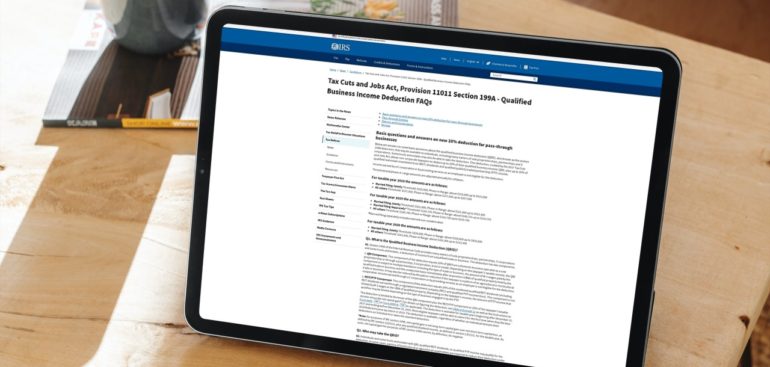In 2017, there were major changes to tax law. The Tax Cuts and Jobs Act included reductions in tax rates for businesses and individuals, increasing the standard deduction and family tax credits, eliminating personal exemptions, and making it less beneficial to itemize deductions, limiting deductions for state and local income taxes and property taxes.
With these reductions of tax rates for businesses, it was felt that this would be very fair for small businesses. Most small businesses are set up as pass-through entities. This is where the income tax is passed through the entity and the tax responsibility is left on the owner or owners as individual taxpayers. To level the playing field, Section 199A was added to the Act.
What Is Section 199A?
Section 199A details an individual taxpayer deduction for qualified business income. It is called the Qualified Business Income Deduction. This deduction allows eligible self-employed and small business owners to deduct up to 20% of their business income, REIT dividends, or qualified publicly traded partnership (PTP) income on their individual tax returns. The Qualified Business Income Deduction lowers your taxable income, which is the amount used to determine how much you owe in taxes. Unless changes to this law are made, it is to be available for tax years 2018-2025.
The 20% Qualified Business Income Deduction is calculated as the lesser of 20% of the taxpayer’s qualified business income, plus (if applicable) 20% of qualified real estate investment trust dividends and qualified publicly traded partnership income or 20% of the taxpayer’s taxable income minus net capital gains. The 20% deduction reduces federal income tax but not Social Security or Medicare taxes. It also does not reduce self-employment tax.
Who Qualifies for the Qualified Business Income Deduction?
The 199A deduction is provided for sole-proprietorships, partnerships, S-corporations, trusts, or estates. Income from C-corporations, any trade or business whose principal asset is the reputation or skill of one or more of its employees or owners or services you performed as an employee of another person or business does not qualify.
This does not mean that any business income from these entities qualifies for the 20% deduction. This deduction comes with significant qualifications. This is what they call an “above-the-line” deduction, so it does not matter if you take the standard deduction or if you itemize on a Schedule A. The deduction is only for pass-through entities and qualified business income from these entities. It is not available for wage income and can be limited by which type of business in which you are engaged, your taxable income, W-2 wages paid, and the unadjusted basis immediately after acquisition of qualified property.
The Qualified Business Income Deduction is the net number of qualified items of income, gain, deduction, and loss from any qualified trade or business. This includes but is not limited to the deductible part of self-employment tax, self-employed health insurance, and deductions for contributions to qualified retirement plans. The Qualified Business Income Deduction is the taxable income that comes from a domestic business. If a business has both domestic and foreign income only the domestic income qualifies.
What Does Not Qualify For the Qualified Business Income Deduction?
The Qualified Business Income Deduction does not include items such as:
- Items that are not properly includable in taxable income
- Investment items such as capital gains or losses or dividends
- Interest income not properly allocable to a trade or business
- Wage income
- Income that is not effectively connected with the conduct of business within the United States
- Commodities transactions or foreign currency gains or losses
- Certain dividends and payments in lieu of dividends
- Income, loss, or deductions from notional principal contracts
- Annuities, unless received in connection with the trade or business
- Amounts received as reasonable compensation from an S corporation
- Amounts received as guaranteed payments from a partnership
- Payments received by a partner for services other than in a capacity as a partner.
- Qualified REIT dividends
- Publicly traded partnership (PTP) income
There is a safe harbor rule for 199A purposes available to individuals and owners of pass-through entities who seek to claim the deduction under section 199A with respect to a rental real estate enterprise. Under the safe harbor, a rental real estate enterprise will be treated as a trade or business for the purposes of the Qualified Business Income Deduction if certain requirements are met.
Also, there are income limitations to qualify for the deduction.
2020 Qualified Business Income Deduction Income Thresholds
| Filing Status | Income Threshold (limit for the full deduction) | Income Limit for a partial deduction |
| Single | $163,300 | $213,300 |
| Head of household | $163,300 | $213,300 |
| Married filing jointly | $326,600 | $426,600 |
| Married filing separately | $163,300 | $213,300 |
If you are below these thresholds, it is very straightforward and you should qualify for the 20% deduction on your taxable business income.
If you are above these limits, it gets confusing as to who qualifies and who does not. Above those limits, your ability to claim the deduction depends on the precise nature of your business. Even if your business qualifies, you may not get to enjoy the full 20% break as the deduction phases out for certain types of businesses.
Determining If Your Business is an SSTB
If the business owner’s taxable income is above the income limits, you will need to determine if the business is a specified service trade or business (SSTB). An SSTB is a trade or business involving the performance of services in the fields below:
- Accounting
- Actuarial science
- Athletics
- Brokerage services
- Consulting
- Financial services
- Health services, such as performed by doctors and nurses
- Investing and investment management
- Law, including lawyers
- Performing arts
- Trading
Many businesses offer a multitude of services or products. A business will not be considered an SSTB if less than 10 percent of the gross receipts, (5 percent if gross receipts are greater than $25 million) of the trade or business are attributable to the performance of specified services.
Many business owners are trying workarounds to restructure their businesses by splitting up their business into two or more entities with the same owner to separate the SSTB income and non-SSTB income and avoid missing out on part or all the Qualified Business Income Deduction.
To prevent this workaround there are set rules that if a non-SSTB has 50% or more common ownership with an SSTB and the non-SSTB provides 80% or more of its property or services to the SSTB, the non- SSTB will by regulation be treated as part of the SSTB.
What If Your Taxable Income is Above the Threshold?
If your taxable income is equal to or higher than the threshold, your maximum possible deduction is subject to limitations. How much you can get will decrease based on your income.
The deduction considers multiple factors, and the instructions will walk you through them. If the income is from a specified service trade or business (an SSTB), it does not qualify for the deduction once it passes the maximum threshold.
If you are between the thresholds and an SSTB, the deduction will be phased out until it no longer exists. If you are not an SSTB and you go over the phase-in range, your deduction could be limited by your W-2 wages paid or the UBIA of qualified property held by a trade or business.
There are many more factors that affect a taxpayer’s qualifications for the deduction and factors that set limitations on the percentage one can deduct. The IRS has noted that 95 percent of small business owners will fall below the thresholds and not have to worry about the limitations. If you are below the threshold, you would use IRS Form 8995 (Qualified Business Income Deduction Simplified Computation).
If your taxable income is more than the income threshold then you would use IRS Form 8995-A (Qualified Business Income Deduction). Both of these forms take you through the process of adding up your qualified business income, qualified REIT dividends, and qualified PTP income. This will determine the amount of your deduction.
Are You Taking Advantage of the Deductions Available to You?
I am sure many questions are still left unanswered. This is one of the most complex tax laws not only from the 2017 Tax Cuts and Jobs Act but in all of the tax codes. The IRS website provides a lot more information if you’d like to dig in further.
The Treasury Inspector General for Tax Administration has identified nearly 900,000 returns filed for 2018 that did not take the Qualified Business Income Deduction even though it appeared that they qualified. In my past articles, I have always recommended that a taxpayer seeks advice and assistance from a true tax professional.
When it comes to the 199A deduction, it is imperative that a business owner has the correct tax professional assisting them especially if they are above the limitations. Enrolled Agents, CPA’s and Tax Attorneys can make sure you are not missing out on this valuable deduction and formulate strategies in the operation of the business that will increase the likelihood of you being able to benefit from the Qualified Business Income Deduction. Most importantly, as complex as it is, they can make sure that your tax return is filed correctly so that you get the correct deductions and don’t have to worry about a future IRS examination or an IRS audit.




